A prebiotic is a supplement that both men and women can use to improve their digestion and overall gut health. Prebiotics can also help develop a stronger immune system, better bowel movements, and minimize constipation.
With a prebiotic, it’s important to know:
- Prebiotic’s help ward off dangerous bacteria, and it increase your bone density.
- The fiber found in prebiotics acts as a food source for microbes in your gut, a major key for stellar digestive health.
- Prebiotic’s can help prevent bloating if you’re prone to an upset stomach.
Below you’ll find the top 10 prebiotic supplements on the market, research and backed by our expert health panel at BestHealth.org.
Our Winners
Best overall: 1MD PrebioMD
Best prebiotic for weight loss: 1MD PrebioMD
Best prebiotic and probiotic combination: 1MD Complete Probiotics with Prebiotic Powder
Best prebiotic fiber: Performance Lab Prebiotic
Best prebiotic for constipation: Dr Tobias Prebiotic
Best Overall
1. 1MD PrebioMD
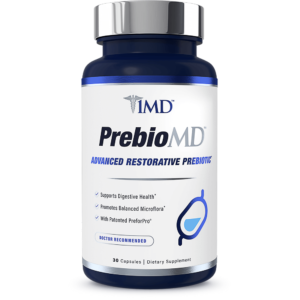
1MD PrebioMD is one the most advanced prebiotic supplements available, containing patented PreforPro® for powerful digestive support.
It also includes Xylo-oligosaccharides and Galacto-oligosaccharides for better immunity and digestive health. With no fillers or additives, it’s our clear #1 choice.
2. 1MD Probiotics Platinum
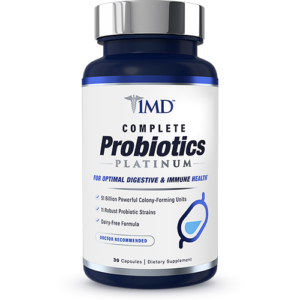
Calibrated for both men and women, 1MD Probiotics Platinum is forged with 11 bacterial strains proven to provide the most superior benefits to your digestive health.
3. Performance Lab Prebiotic

This prebiotic boosts Bifidobacterium, which is a probiotic that helps with digestion and fighting off harmful bacteria. It’s advanced microflora supports peak metabolic, digestive, and immune performance.
4. Dr Tobias Prebiotic
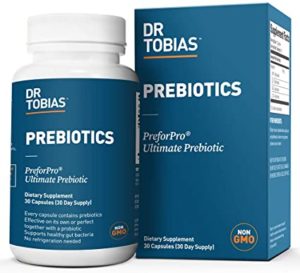
If you have digestive problems like bloating, stomach discomfort, and diarrhea, this prebiotic is for you. It supports your floral bacteria by feeding your healthy bacteria and eliminating the bad bacteria.
5. Now NutraFlora FOS
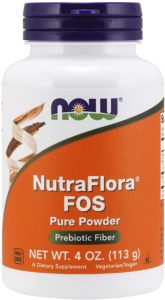
NutraFlora FOS is an allergen and GMO-free powder that aids the growth of beneficial bacteria.
It’s GMP manufactured, meaning that it’s been examined for stability, potency, and product formulation.
6. BIMUNO
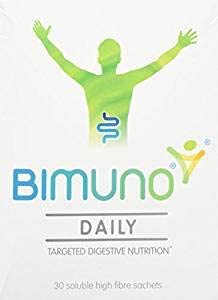
This supplement contains a unique active ingredient, Galactooligosaccharides, which catalyzes the growth of good bacteria in your gut. From just seven days of taking this supplement, you’ll increase this powerful bacteria.
7. Physician’s Choice Women’s Probiotic
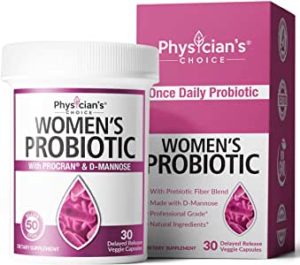
This probiotic is specifically designed for women, as it contains 50 billion CFUs and 6 probiotic strains including Lactobacillus, Gasseri, Acidophilus, Plantarum, Paracasei, Casei, and Bifidobacterium Lactis.
It supports the urinary tract, immune health, and feminine health.
8. Align DualBiotic
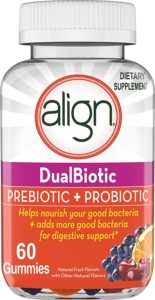
This is the doctor’s #1 recommended probiotics brand and contains insulin to nourish good bacteria in your digestive health.
It’s natural fruit flavors with less than 1 gram of sugar makes it the most delicious probiotic and prebiotic you’ll take.
9. BlueBiology Prebiotic
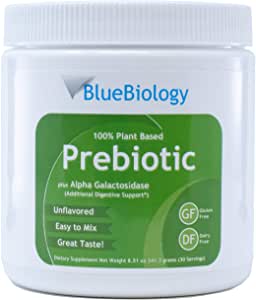
This supplement contains the prebiotic, Alpha Galactosidase, to fuel good bacteria growth, and it prevents bloating and promotes gas relief.
It contains no artificial or synthetic ingredients making it a pure, quality prebiotic.
10. BeLive SYNBIOTICS
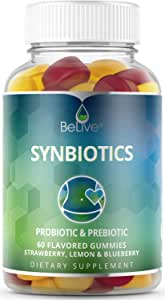
This prebiotic carries chicory root and inulin to feed and maintain beneficial bacteria.
If you’re a vegan, don’t fret because this supplement doesn’t use gelatin or any other animal products and instead is equipped with the vegan bacteria strain, Bacillus coagulans.
11. Hyperbiotics Organic Prebiotic Powder

If you’re prone to stomach problems, this prebiotic is furnished with an organic proprietary blend to help you avoid an upset stomach.
It’s been clinically studied to support your gut bacteria by pushing the growth of favorable bacteria.
Best Prebiotic For Weight Loss (Our Winner)
1. 1MD PrebioMD

This supplement supports the balance of your gut bacteria and the makeup of your intestinal wall for an optimal gut barrier.
1MD PrebioMD takes the top spot as the best prebiotic for weight loss because it provides the ideal amount of microbes to support healthy weight management.
Best Prebiotic and Probiotic Combination (Our Winner)
1. 1MD Probiotics Platinum

This prebiotic and probiotic contains ingredients that have been shown in numerous clinical studies to improve digestive health by aiding the useful bacteria living in your gut.
1MD Probiotics Platinum takes the top spot as the best prebiotic and probiotic combination because it contains 11 potent strains, including Lactobacillus, acidophilus, and Bifidobacterium, alongside powerful prebiotics to maximize digestive health.
Best Prebiotic Fiber (Our Winner)
1. Performance Lab Prebiotic

This prebiotic contains concentrated fructooligosaccharides, which is a non-digestible carbohydrate and assists the growth of good intestinal bacteria with added probiotics.
Performance Lab takes the top spot as the best prebiotic fiber for providing a hefty dose of fiber in a prebiotic infused Nutricap.
Best Prebiotic For Constipation (Our Winner)
1. Dr Tobias Prebiotic

This prebiotic is designed with specialized plant fibers that act as a fertilizer to stimulate the growth of healthy bacteria in your gut for better digestion.
Dr Tobias takes the top spot for the best prebiotic because it’s curated to give you optimal gut health, which is critical for a good bowel movement.
Who Should Use a Prebiotic?
Your digestive health has an enormous effect on how the rest of your body functions, and improving it can help protect you from various ailments like constipation, IBS, and other digestive issues. It may also help with weight loss and satiety.
While both men and women of all ages can to take prebiotics, people specifically suffering from constipation or irritable bowel movement should especially consider taking a prebiotic. People on medication, children, pregnant women and diabetics should speak to a doctor before taking a prebiotic, as it may cause problems in these populations.
You should always titrate up as prebiotics may cause abdominal bloating and pain in some individuals if they are consumed in large doses.
Methodology
Beneficial Bacteria: Prebiotics must contain certain beneficial bacteria, such as Bifidobacterium, which helps with digestion and getting rid of harmful bacteria. Galactooligosaccharides is another useful bacteria contained in the best quality prebiotics, which is why we ranked the prebiotics containing these potent ingredients at the top of our list.
Adequate Fiber: A prebiotic is essentially a type of fiber, so the amount of fiber each prebiotic contains played an important part in ranking them. This is promptly why certain ones like Nutraflora FOS were our winner for the best prebiotic fiber. Dr Tobias was also awarded a spot in the rankings since it’s made with specific plant fibers that invigorate the expansion of beneficial bacteria, which reduces constipation.
Added Probiotics: Prebiotics main job is to improve your digestive system and gut health. Any bonus features some prebiotics specialized in compared to others is why they showed up on the list. For example, 1MD Probiotics Platinum has the perfect amount of microbes in your digestive tract to help you control your weight. BeLive SYNBIOTICS contains the vegan bacteria strain Bacillus coagulans, which is beneficial for any vegan looking for a quality prebiotic.
Benefits
A prebiotic supplement can reduce your risk for kidney disease and intestinal disease. Having kidney and intestinal diseases can alter your bowel movements and lead to constipation. Kidney disease, among numerous other diseases, is also associated with gut microbiota imbalance. The short-chain fatty acids in prebiotics can improve your gut health and decrease your risk for chronic kidney disease (1).
Intestinal disease is an inflammation of your digestive tract and can cause abdominal pain, diarrhea, and bloating. It’s typically caused by not getting proper nutrients from diet alone. However, some research is showing that prebiotics can fight off intestinal disease and colorectal cancers (2).
A review published in 2015 shows that your intestines play an important role in regulating your bone health (3).
A prebiotic may increase your bone density. Strong bones are important for your skeletal system to move and function properly; and if you have denser bones, they’re less likely to get fractured or cause other disabilities.
This is chiefly important to take care of as we age since your body’s natural inclination is to reduce the density of bone mass as you get older. So if you’re above 40 years of age, you must increase your calcium and magnesium levels to support your bone density. The best way to do that is with prebiotics and probiotics.
Several studies have shown that probiotics can help bone metabolism and bone mineral density. This is because some probiotics contain the bacteria, Lactobacillus, and Bifidobacterium, which increases the bioavailability of important minerals like calcium and magnesium to increase bone mass density (4).
Current scientific research also supports prebiotics as a sustainable approach to increase your skeletal health and fraction prevention (5). That’s because prebiotics help with the absorption of calcium and magnesium. The more your body is capable of absorbing calcium and magnesium, the healthier and stronger your body and bones will be.
Prebiotic’s can enhance and strengthen your immune system. Your immune system protects your body against environmental agents to keep your body running smoothly. Dietary fibers, which can be found in many prebiotics and probiotics, have proven to be effective in strengthening your immune system (6).
Digestive problems, fatigue, and constantly getting sick are all common signs of a weak immune system. With a stronger immune system, you’ll have more energy, get sick less often, and feel less stressed.
Building a strong immune system from foods alone can be a challenge for many people. Thankfully, prebiotics have your back and can give your immune system the edge it needs to function at its highest quality.
A prebiotic supplement could lower your blood triglyceride levels. Triglycerides are fats (lipids) found in your bloodstream that your body utilizes for energy. Unfortunately, too much of a good thing can be bad for you. Having too high levels of triglycerides in your blood can harden or thicken the artery of your walls, which can lead to a stroke, heart attack, or other heart diseases.
One 2015 study examined 92 participants for 12 weeks who had high triglyceride levels. The study concluded bacteria strains, such as Lactobacillus Plantarum and Lactobacillus curvatus, significantly reduces blood triglycerides (7).
Prebiotic’s can help with constipation. The foods and supplements you put in your body have the greatest impact on controlling constipation. Of course, the unhealthier you eat, the higher your chances are to suffer from constipation.
Fiber is one of the best substances you can fuel your body with to prevent constipation. Through the use of prebiotics, your body will be sure to get the fiber it needs, especially if you take a prebiotic like 1MD PrebioMD, which is prominent for its high levels of fiber.
Food and Nutrition Sciences published a study in 2014 suggesting that prebiotics can regulate constipation. It reported, “to rebalance the microbiota and improve the symptom of constipation, it is recommended to intake prebiotics, probiotics, and symbiotics, which works in the modulation of a healthy intestinal microbiota and favors the production of short-chain fatty acids that have a positive effect on intestinal transit (8).”
A prebiotic can help you control your appetite and weight. Obesity is a prevalent disease that affects many Americans. Sadly, more than 40% of Americans classiy as obese. The most daunting part of this is that being obese can lead to many terminal diseases like diabetes and cardiovascular health diseases.
The most common cause of obesity is a lack of exercise and a poor diet. One way you can get yourself to eat less is by reducing your appetite. Fortunately, growing research is indicating that prebiotics can reduce your appetite (9).
Another study also showed that prebiotics increase satiety hormones and alter Bacteroidetes and Firmicutes in lean and obese people (10).
A prebiotic supplement may reduce your anxiety levels. Besides the uncomfortable physiological response anxiety spreads throughout your body, it can affect the activities of your everyday life. Luckily, the merit of a prebiotic has the potential to calm the effects of anxiety.
One study showed that taking probiotics with a certain strain of bacteria (Lactobacillus rhamnosus), has shown to help dramatically reduce anxiety (11).
Prebiotic’s can improve your bowel movement. A fine-tuned bowel movement can save you from the embarrassment of constipation. Constipation is often caused by a lack of dietary fiber, and many prebiotics contain enough dietary fiber to help prevent this.
A clinical study of 44 patients with Rome II positive IBS performed a 12-week trial scrutinizing the effects a strain of prebiotic had on irritable bowel syndrome. The analysis demonstrated that a novel prebiotic trans-galactooligosaccharide is an effective therapeutic agent for improving bowel movement. Anxiety levels were also measured and reduced in patients to further prove the notion mentioned earlier that prebiotics are beneficial for anxiety (12).
Another review article published in 2008 concluded that probiotics and prebiotics reduce symptoms of irritable bowel syndrome (13).
A prebiotic could improve your digestive system. An optimal digestive system allows food to easily absorb into your system which optimizes your body by providing it with the nutrients and energy it needs. As such, improving your digestive system will improve your gut health because your gut health is linked to the equilibrium of microorganisms that live in your digestive tract. A healthy gut means you’ll have a better functioning immune system, heart, and brain, as well as your mood and quality of sleep, will improve.
The Cambridge University Press issued an article in 2013 that showed prebiotics to alter the gastrointestinal microbiota to control digestive problems (14).
Prebiotic’s could help with metabolic disorders. Metabolic disorders like type 2 diabetes and cardiovascular disease is a widespread public health issue. Many of these disorders can be prevented or corrected with proper exercise, diet and supplementation routines. In fact, research is even starting to analyze the potential benefits prebiotics can have on your gut health to improve your metabolic functioning (15).
In 2013, an article stated that “Higher intakes of dietary fiber are linked to less cardiovascular disease and fiber plays a role in gut health, with many effective laxatives isolated fiber sources (16).” Since prebiotics is a type of fiber, adding them to your diet will decrease your chances of getting metabolic disorders and other diseases.
A prebiotic supplement may decrease your risk of cancer. Prebiotics produce important short-chain fatty acids that help your body produce healthy microbes in your gut to fight off carcinogens. Certain cancers like colorectal cancer, better known as colon cancer, have been shown to decrease after the administration of prebiotics (17).
A prebiotic may lower your stress levels by decreasing your cortisol levels. One study examined 45 healthy volunteers who received either prebiotics or a placebo for 3 weeks. After analyzing the participants, it was concluded that prebiotics help minimize the release of cortisol and emotional processing (18).
Recap
Prebiotics are wonderful supplements to take if you want to improve your gut health, which leads to improving your overall health since gut health plays such a vital part in how the rest of your body functions.
Prebiotics can prevent constipation, improve your bowel movement, and even help you manage your weight.
For BestHealth.org’s #1 recommended prebiotic, click here.